With
a career that spans over 4 decades, Martha Wash has seen her share
of the music industry and has emerged with something not all can
claim- integrity. With a lifetime of experience in her rearview
mirror, Wash, often titled The Queen of Clubland, has a new album
out on her own label and proudly owns her new stance as an Indie
artist.
She was set to perform at Tampa Pride 2020, however COVID-19 postponed
Tampa PRIDE to 2021, but she took some time to answer some questions
in an interview with Tampa Bay Gay's Kim Corda, right before the
closures.
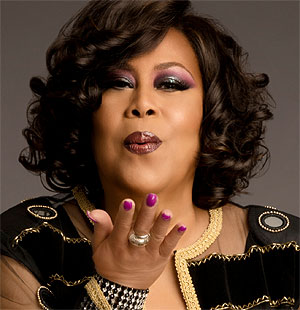 Photo
Credit:
Mike Ruiz
Photo
Credit:
Mike Ruiz
Kim Corda: Looking at the breadth of your career, it
seems as though you have done what many artists could only dream
to achieve, namely longevity. To what do you attribute your
success?
Martha Wash: (Laughs) I guess being stubborn and refusing
to give up. I had thought about it a few times over the years,
to just stop the career and go into something else, but I'm
still doing it. So, call me crazy.
I think it's the fans that I've accumulated over the years;
the ones that have been with me since day one even to the newer
generation who are just finding out about me. I think that's
possibly what it is. They've kind of latched on to my music
and that's a great feeling.
KC: Can you pinpoint times in your career that were either
"the best" and /or "the worst" and what did you learn from those
times?
MW: The bestů I think probably early on in my career
(laughs) not knowing a lot about this business. Just going out
and singing and doing the shows and making new fans and stuff,
they were probably some of the best times.
What's going on now is a whole new thing (of people finding
out about my music). The beginning and now would be the best
times and the worst time was probably the early 90s when I had
to go through all the litigation with the groups. That was one
of the worst times for me, but I survived all that and I'm still
here so what can I tell you?
KC: Yes. And when you look at the situation (the 90s
lip syncing scandals) as an outsider it seems like it was something
you just dealt with, but one could imagine on a personal level
how stressful and hurtful that experience must have been.
MW: Well, you know, the thing is you have to go through
the negative stuff and the the things that hurt you or could
possibly make you step back from life, but you have to go through
those things to appreciate where you are in the present. And
be able to survive them and say, "Yeah, I went through all that
and I came through it and I'm still standing." You can't have
one without the other. Somewhere, sometime in your life, not
so good things are going to happen to you, it just depends on
how you're going to react.
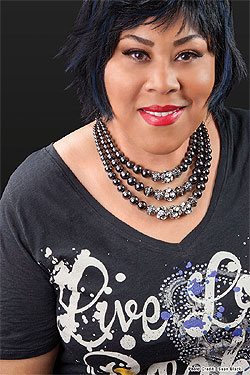
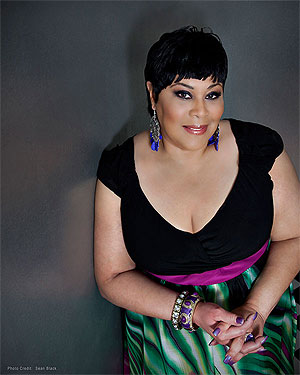
Photo
Credit: Sean Black
KC:
It seems that the outcome was a win for performers because now
you have to credit the artists who then have rights to royalties
for their work. Have you seen any changes in the music industry
lately that have been positive?
MW:
I'll just say that there are more Indie artists out there getting
their music heard which is a great thing. There are so many
more music platforms that people can find to hear Indie artists
whereas previously you didn't hear about them quite as much
because the major labels were only promoting major artists.
But with the new music platforms, between that and the internet,
you can find music anywhere, any time of the day, and come across
somebody that you've never heard of before. Then you may play
their music and say "Wow, I really like this." I think that's
the great part about it.
KC: So it's become more accessible to the fans and the
general public.
MW: Exactly.
KC: Has that made it more difficult for artists to capitalize
on their work?
MW: Mmmm. I don't think so. If you're the Indie artist,
you know what you've got to do to get yourself out there to
be listened to. I'm an Indie artist after all of these years.
And it does take a lot because remember, if you're on a major
label, the label takes care of everything else for you. When
you're an Indie artist, you have to do everything that the major
label was doing for the artist. So, it does take more time,
it can take more resources and that sort of thing, but I think
in the end, the artists have more control over their brands.
KC: And so, you have your own recording label now, correct?
MW: Yes.Purple Rose Records. (http://www.purpleroserecords.com/)
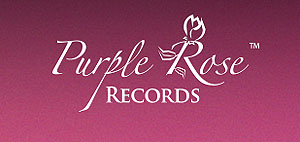
Photo
Credit: Purple Rose Records Website
KC:
Who are some of your favorite artists past and present?
MW: Wow. Well, I'll put it like this, I'm kind of old
school as far as the music and the artists are concerned because
I came up during the time of the Motown sound and some of the
rock groups and things, so I go back that far. As far as the
new artists are concerned, I do like Lizzo, I do have to say.
I think she's absolutely fabulous, just a multi-talented young
lady. There are some really good ones out there now that I appreciate.
KC: In an article published in Rolling Stone in
2014, you stated that you had to sneak listening to secular
music when you were young. Did you perceive any related barriers
to becoming a performer on the disco scene?
MW: Well, I'll put it like this, my parents weren't thrilled.
Because I came from a very religious household so that's why
I had to sneak the music in. Between that and listening to the
radio under my pillow at night. That's what I would do. I knew
that I would always sing, I just didn't know which genre it
would be in. Naturally, my mother wanted me to continue to sing
Gospel music, because she loved to sing herself. I told her,
"Look, whatever it is, whatever kind of music I might sing,
it still wouldn't keep me from having the Gospel music foundation
that I grew up with." That would never leave. So I was able
to appreciate all kinds of music growing up whether I played
it on the record player or listened to it under my pillow at
night. I could hear all kinds of music on the different stations
back in San Francisco. That's what helped me you know. I just
liked all kinds of different music.
KC: It sounds like you were driven at that point in your
life to just do what you loved to do.
MW: Yeah. I didn't know exactly what area it would be
in. As it turned out it wound up being top 40 music that evolved
into disco music. That's really where my professional career
started.
KC: You've done a lot of different things in music so
that it appears that it wasn't one straight line for you. You've
kind of weaved in and out and perhaps recreated yourself or
your sound.
MW: That's why I started the label. I could put out any
kind of music that I wanted to. The new album, Love &
Conflict, is more blues-rock, and pop, and a hint of
psychedelic, and a little county. (Laughs) You see what I'm
saying?
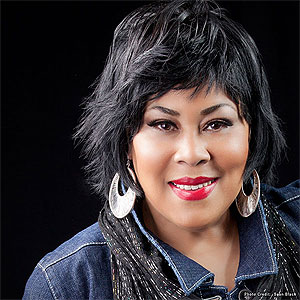
Photo
Credit:
Sean Black
KC:
You're not in one box. You get to explore different genres and
not have people comment. Well, I guess people will say what
they're going to say but it's nice to say "I don't care. I'm
doing my thing. It's my label and you can't tell me what to
do." Right?
MW: Exactly, I've always said that I never wanted to be
pigeonholed into one genre of music. I want to record whatever
I want to record and put it out. Now, hopefully people will
enjoy the music. Everybody knows me from doing dance music.
That's all well and fine, but I'm more than that and always
have been. So, follow me on this journey. You may hear some
songs that you like. And the next album I put out will probably
be totally different again. But just allow the artist to grow
and experiment and be able to put out the kind of music that
they want to put out. Don't just put them into one particular
area of music and expect them to do it for the rest of their
life.
KC: I perceive that a lot of fans get their feathers
ruffled when their favorite artists have a departure from the
norm. As I get older, I appreciate more and more that we all
go through different phases in life and you need to express
yourself differently than you did when you were 20.
MW: Exactly. Are you, as a person, going to stay the
same as when you were in your 20s, but now you're 50? We all
evolve so I say, let the music evolve with you.
KC:
You are known to be something of an advocate for the LGBTQ community
as well as for HIV/ AIDS awareness, support and funding. Quality
Services for the Autism Community is another organization for
whom you are a spokesperson. You must see and hear of many inspirational
and also heart wrenching stories. Do you see your role as an
advocate as something that drives you?
MW: Um. I'm not going to say that necessarily. I will
talk or I will provide my services when people come to me and
ask me to help them. Say, HIV and AIDS, when the big crisis
was going on back in the 80s, it was just absolutely dreadful
and there were a lot of organizations that were springing up
to try and help the people in their communities deal with this
horrifying illness. I remember I did so many shows, or I should
say we, because I was still singing with Izora Rhodes at the
time, with Two Tons of Fun and The Weather Girls, and it was
just something that you did. People called and would say, "Would
you please help us raise money for our organization?" Because
there was nothing going on to help people that had AIDS, so
these local communities were setting up hospices and facilities
to try and help people who were dealing with this. So that's
where my activism comes in as far as doing the show and speaking
to people at times and visiting facilities. I have done that
on occasion to talk to people and I share my story and they
share their story. I do what I do the best way I can as far
as helping people.
QSAC.
That came to me, believe it or not, when I was watching a soap
opera, and the story line was about a little girl, about 7 or
8 years old, who had Autism and I watched it for a couple of
years and the thought crossed my mind: "OK, Well, she's got
Autism, and if she continues to live she'll be an Autistic young
woman. What kind of services are provided for adults with Autism?"
Naturally, you want to find out as early as possible if a child
is on the Autism spectrum, but over time, that child is going
to become an adult and you have to shift your expectations.
What I found out was that there are a lot of high functioning
adults with Autism who only want to be people who work in their
communities, who can support themselves, and just live and be
like everyone else. The only problem is, they have Autism. So
that's where my activism comes in with QSAC.

There
are so many different causes and situations that people have
to deal with on a day to day basis. We all have challenges.
Some are more pronounced or visible and then there are others
that you don't really see, but are challenges nonetheless. I
think it's also about being empathetic to people. And don't
take everything and everyone at face value.
KC: You are something of an icon for the gay community.
Do you recall when that came about? Was it a conscious step
you made or was it something that randomly happened or evolved
through your music?
MW: No. Not at all. In school, I had gay freinds and
it never bothered me. They were just my friends. I had teachers
that were gay. They were just my teachers. And then when I started
singing with Sylvester, it just continued on. They're basically
my number one fan base and have been for decades. You know,
people are people. I don't care what your sexual orientation
is. If I like you, I like you. That should have no kind of bearing
on whether I like you or not. You're another human being.
KC: If only everyone could see it that way...
MW: Well. Yeah. When you start putting up barriers and
you have these isms and schisms, you can narrow your thinking
very, very small. My feeling has always been If God created
you then who am I to say that you're wrong. I have no authority
or judgement to place you in a positive or negative category.
You're just who you are. Now, what I'm going to do if I want
to, is accept you or not. And I choose to accept.
KC: Is there a message that you would offer to your fans
and the LGBTQ community on being true to yourself?
MW: That's just it right there. Be true to yourself,
whoever you are. At the end of the day, we're all singular beings.
You're not like me, I'm not like you. I don't live in your skin
you don't live in mine. When you take your last breath, it's
just you. Love whoever you are. Be the best person that you
can be and spread love. Spread positivity. Uplift people. You
don't know what the next person is going through and sometimes
a perfect stranger can say something to you that can lift your
spirits. Or they said something that's very poignant to you
that you needed to hear at the time, and they don't know it.
They didn't know it but they said something very profound to
you. I sometimes say that people can interchange with angels
anywhere. It can change your whole outlook.
The
section below was to run with Tampa Pride 2020 (March then June
2020).
Since the interview COVID-19 postponed Tampa Pride 2020. We
decided to keep this part of the interview online to celebrate
PRIDE 2020 and what we can look forward to from Marth Wash this
year!
KC:
You're slated to perform as the headliner at the Cuban Club
in Ybor City as a part of Tampa Bay's Pride celebration this
year. Without giving away any surprises... will there be any
surprises??
MW: (Laughing) I'm not gonna say. Listen, I just want people
to come out and have fun and celebrate. Celebrate your greatness,
whoever you are. Celebrate you and celebrate the people around
you. When people can come together with a like mind and celebrate
each other, it's a wonderful thing. There can't be a downside
to that. If everybody is in a great mood and they want to have
fun, be it adults or children, and they are celebrating each
other, then that's a great day.
KC: Have you performed at pride celebrations previously?
MW: How about for quite a few decades now?
KC: So you've experienced it. It's a lot of fun. Is it
something you look forward to?
MW: Yes. Because depending on where I'm going, if I'm
going to a place for the first time, I'm not quite sure what
to expect, but usually at the end, it's all great. The fans
are having a great time, the music is good, everybody's in a
great mood. There are some Prides that I've done, like every
other year, which is fun. Then there are new places that I've
done and that's always fun too because it's new for me. They're
all different.
KC: Do you have a favorite song to perform?
MW: Well, as far as the audience is concerned, their
favorite is always "It's Raining Men." I think with some of
the newer music, I'll probably possibly do a remix of one or
two of the new songs from the new album (Love & Conflict).
But for the most part, everybody wants to hear "It's Raining
Men."
In parting, she offers, "I hope that everyone likes the new
album. It's available on all music platforms."
Wash performs both solo and with The First Ladies of Disco,
has her own record label and production company, and a You Tube
channel- Martha Wash TV.

Interview/Written By:
Kim Corda - Tampa Bay Gay Contributer
Her brand new album, Love & Conflict available
here.
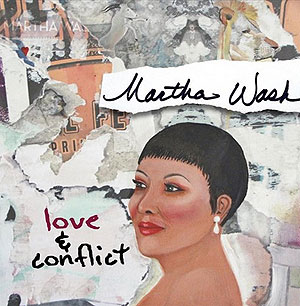
Follow Martha Wash:
Website: https://www.marthawash.com
Twitter: http://www.twitter.com/Martha_Wash
YouTube: http://www.youtube.com/officialmarthawash/
Facebook: https://www.facebook.com/themarthawash/

